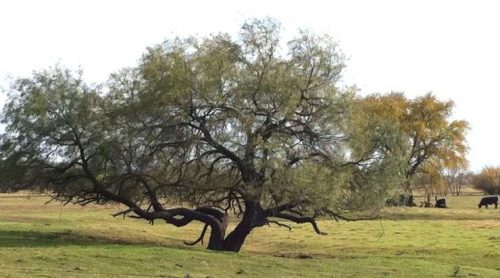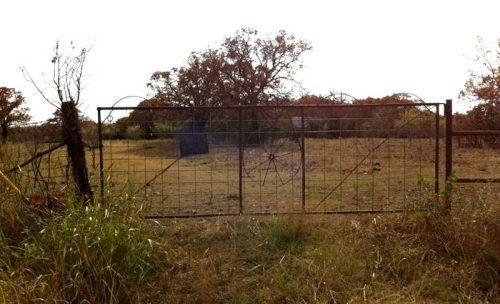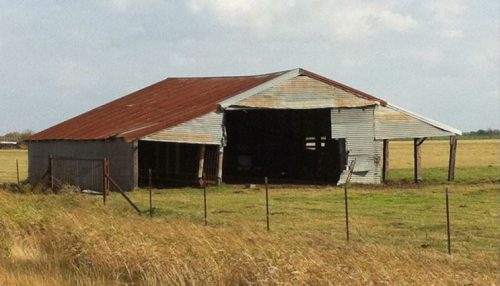
Brad Green writes from Denton, Texas, dry, empty land filling up with urban detritus no different from anywhere else. But it looks different, and Brad writes of it with a raw, desolate naturalism reminiscent of the young Larry McMurtry of, say, The Last Picture Show. Someone just wrote dg about these “What it’s like living here” pieces. She said, “I guess what I like best is that every essay, supposedly on place (and even when it seems to strictly adhere to details of a place’s terrain and citizens) is really, at the end, so nakedly about its author.” All dg can add is, “Yup. That’s the way it works.” Read this one.
dg
.
What is Felt
Of course, the days are filled with sound. That sense comes to you well before touch, before sight or cognition even. It’s habit now to slap that numb walrus of a hand on the alarm to halt the return of the world, anything to stay away for a few moments more, but your feet find the floor in the dark and bear your morning wobble. They always do. The bedroom door squeaks open. Steam billows in the shower. You forget to flip on the exhaust fan and when you step past the fish-patterned curtain, the mirror reveals your face full of fog. Who you are sharpens as the morning evolves, though. A half-hour later, your fingers feel blood-carbonated and you’re able to grasp the toothbrush, the keys, the steering wheel. One can curse the carpal-tunnel or consider it some sort of earned pain the way a war hero carries an amputation, but really, you’ve done nothing heroic—ever. That numbness pillows each night because you hunch over the keyboard, filling your evenings with failure.
What is Feared
The road is white in the morning air. It’s some new compacting gravel that men in mudblistered trucks put down. You live far enough out that you don’t warrant asphalt. Slow cattle bend their heads to the grass and oaks thick with dust blur through the window glass. At stop signs, the car engine sounds confused. The plugs need changing. Things are out of tune. A hard, black carbon clogs the chambers, the motor working harder than it needs in compressing the distance between you and where you must go. You stop where the gravel road ends and dust boils up around the car. The ground in North Texas is cracked most of the time, congested with bristleroot, trumpet vine, or the tortured gnarls of juniper, so dry it tatters up behind wherever you go. Before you turn onto the paved road leading to the highway, you face the sky, tightening your fists on the steering wheel. Contrary to what people say, wide horizons make us small.

What is Endured
There’s a vent you listen to all day in your office. It hisses air, flutters the leaves of the bamboo you bought for life and color. Faces float by the slim rectangle window in your office door. The email dings reverberate and follow you around, warble the phone in your pocket. One feels pursued, exposed, dedicated, hollow.

What is Lost
Where you work used to be barren field. It seems like that wasn’t so long ago, but the grass waved there long before the baseball of ache took up camp in your lower back, before the stiff gray began its sly fuming around your ears. Concrete and glass have sprouted in vast squares where once in high school you stood naked on the dirt with a girl till the morning sun found you. Now there’s a squatting Wal-Mart, a place impossible to be that human in again. There’s a Best Buy, a Target, the Bed Bath and Beyond, Fuddruckers, IHOP, and the lot, now smooth with concrete, where there was a house in which you got drunk mixing diet coke and beer (a bad night), and another two streets over where your finger found M—’s most precious nub and you watched her buck and shudder into an entirely new person, afraid that you’d committed some irreparable harm. There’s where your father grabbed you by the collar and slammed you against the car for running away, and there, just a short jog down the road, there’s where you lost God.
What is Found
 What’s on the other side is remarkably similar to where you are now.
What’s on the other side is remarkably similar to where you are now.
And that’s what you find moving through the day, the shape of the absences in your life, the holes where things once were. You encounter memory at every turn and each turn shades what you see now. In fact, the more the world glints, the more resonant the once-lived. So you drive around at lunch, finding moments, scribbling them down in your notebook. There’s Thrill Hill where you got that ponderous, brown Oldsmobile airborne before it thudded into the road, scraping the frame against the sun-hot spall. There’s the old barn where you fucked A— and came in her sock, laughing as she wore it crusty all the way home. There’s the pole where C— lost control of his truck and you found him whimpering on the seat, eyes bright with shattered glass. There’s the house where you cranked the big block engine in your 62 Chevy truck, heard something wrong, and had to unwedge a kitten from the fan blades. There’s where you held it soft as warm pudding in your palms, and there’s the field where you cried after hiding it under a rock.

Why these memories? Why not something else? Why not the way a chocolate ice cream cone melts? Why not your high score on Space Invaders? Why not those 45,000 words about a desert planet you wrote after reading Dune when you were eleven? Why not the white flesh of an apple bursting its juice in your mouth?
What is Heard
There are questions you can’t realistically answer, but are doomed to ask. Those questions arise from place. Place fuels our sense of the important and loss is the measure of everything we might become. It’s not the sex we remember as much as where it happened. Death is a thing that occurs in a geographic location and God, well God is absent from the largest space we can imagine. When that place becomes too onerous to bear, you turn to fog and rely on what you hear, because when our palms slip free of their tactile nature, we demand more of the ears and are left with the dings and alarm of a quotidian life: a hissing air vent, the metallic confusion of a car engine, the grey chatter of an office. The keys clatter late at night, those slim hours all that you have to plumb what matters, a narrowing time when the air is fraught with night-creaks and windows blacken the world until place loses it shape to the dark, moments you’ve lost swelling into their forgotten forms, drawing breath again in your mind unmoored by Rum until you finish your day alone with want and that catch in your throat, the numbness threading fat through your palms, the page holding you rapt in its wide, white jaw.

—Brad Green

.
.









